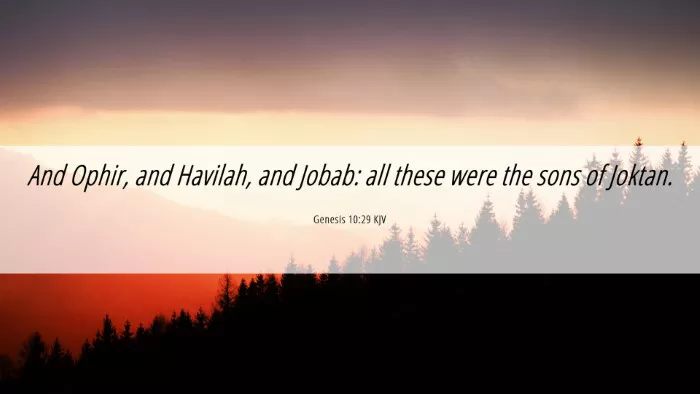Read the Daily Bible Verse Genesis 10:29 To Strengthen Your Spiritual Journey.
Genesis 10:29 (KJV):
“And Ophir, and Havilah, and Jobab: all these were the sons of Joktan.”
Genesis 10:29 KJV Background
Genesis 10:29 is part of the genealogical account known as the Table of Nations, which is found in Genesis 10. This chapter follows the flood narrative and details the descendants of Noah’s sons: Shem, Ham, and Japheth. Specifically, Genesis 10:29 is within the genealogy of Joktan, a descendant of Shem. The King James Version (KJV) is a translation of the Bible that dates back to 1611, known for its majestic and formal English style. .
Genesis 10:29 Meaning
Genesis 10:29 lists the names of three of Joktan’s sons: Ophir, Havilah, and Jobab. These names are not just random; they represent significant peoples and regions in the ancient world.
Ophir: Known in biblical times as a region rich in gold, Ophir is often associated with wealth and prosperity. The “gold of Ophir” is mentioned several times in the Bible, symbolizing purity and high value.
Havilah: Havilah is a region mentioned in other parts of Genesis as well, particularly in relation to the land surrounding the Garden of Eden (Genesis 2:11). This area was known for its precious stones and resources.
Jobab: While less is known about Jobab, his name appears elsewhere in the Bible, including in the genealogies of the Edomites (Genesis 36:33). The mention here likely represents a significant clan or region.
The verse underscores the dispersal of Joktan’s descendants, indicating the spread of civilization and culture across various regions in the ancient Near East.
Application of Genesis 10:29 in Life
Although Genesis 10:29 is a genealogical record, it carries practical applications for contemporary life:
Understanding Our Roots: This verse encourages us to explore our own genealogies and cultural histories. By understanding where we come from, we can gain a deeper appreciation of our heritage and identity.
Value of Legacy: The names listed represent not just individuals, but entire peoples and regions. This reminds us of the importance of the legacies we leave behind. Our actions and values can influence future generations just as these ancestors shaped the course of history.
Stewardship of Resources: Ophir and Havilah were regions known for their wealth in natural resources. This serves as a reminder of the importance of responsible stewardship of the earth’s resources, a principle that is as relevant today as it was in ancient times.
God‘s Sovereignty in History: The genealogical records show God’s hand in the unfolding of human history. Recognizing this can strengthen our faith in God’s sovereignty over our lives and the world at large.
See also: What Does Genesis 10:25 Mean?
Comparison with Other Biblical Texts
Genesis 10:29 should be understood in the context of other genealogical passages in the Bible:
1 Chronicles 1:23: This passage mirrors Genesis 10:29, listing the descendants of Joktan in the genealogical records of Israel. The Chronicles often repeat and expand on the genealogies found in Genesis, providing additional context and emphasis on the importance of heritage.
Genesis 36: This chapter details the descendants of Esau, including a reference to Jobab, illustrating the interconnectedness of different genealogical lines in the Bible.
Matthew 1: The genealogy of Jesus in the New Testament serves as a powerful reminder of the significance of lineage in the Bible. Just as the descendants of Joktan are recorded in Genesis, the genealogy in Matthew highlights the fulfillment of God’s promises through specific family lines.
These passages collectively emphasize the importance of lineage, heritage, and the fulfillment of God’s promises through generations.
Modern Relevance
In a modern context, Genesis 10:29 holds several relevant lessons:
Cultural Diversity and Unity: This verse is a reminder of the diverse origins of human cultures and the interconnectedness of all people. In a world often divided by ethnicity and nationality, it is important to remember that all people are part of a shared human family.
Wealth and Responsibility: The mention of regions rich in resources, like Ophir and Havilah, prompts reflection on how we manage wealth and resources today. It challenges modern readers to consider ethical practices in resource management and to prioritize sustainability.
Historical Awareness: Understanding the genealogical records in the Bible can provide insights into the historical development of civilizations. For modern Christians, this can enhance the understanding of biblical narratives and their implications for today’s world.
Legacy and Influence: Just as the descendants of Joktan influenced the development of ancient societies, our actions today can shape the future. This calls for intentional living, where we consider the long-term impact of our decisions on future generations.
Conclusion
Genesis 10:29 may appear as a simple genealogical record, but it holds profound significance in the broader biblical narrative. It connects us to the ancient past, illustrates the spread of civilizations, and reminds us of the value of heritage and legacy. By reflecting on this verse, we gain a deeper understanding of the interconnectedness of all people, the importance of responsible stewardship, and the sovereignty of God in guiding human history.
Comments on Genesis 10:29
Genealogical Significance: Genesis 10:29 is a crucial link in the chain of biblical genealogies, providing a snapshot of the origins of several key regions in the ancient world.
Cultural Insight: The verse offers insights into the cultural and geographical context of the ancient Near East, highlighting the significance of specific regions like Ophir and Havilah.
Legacy of Joktan: The descendants of Joktan represent not just individuals, but entire peoples and regions, underscoring the importance of legacy and cultural heritage.
Spiritual Reflection: This verse invites spiritual reflection on the themes of heritage, legacy, and the unfolding of God’s plan through human history.


